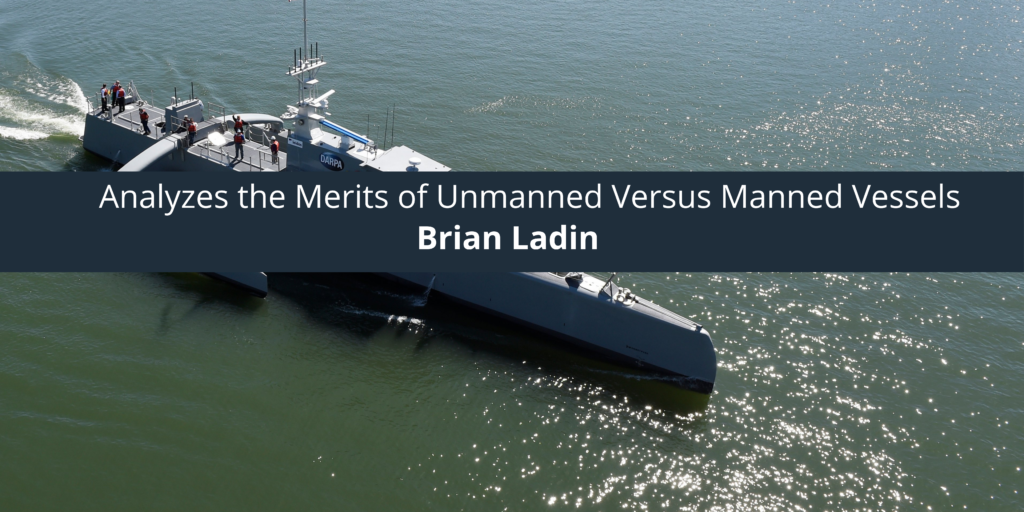Brian Ladin Analyzes the Merits of Unmanned Versus Manned Vessels


As the talks of unmanned vessels intensify, it is becoming quite clear that the only questionable thing about this invention is its timing. Scientists and innovators alike have certainly proven that a cargo-carrying automated vessel will exist at some point. Now, most of the spotlight for this debate is focused on predicting the year in which the world will let automated ships take over.
Before such a chain of events takes place, it is vital to comprehend all the positive and negative implications of relying upon unmanned ships. In addition, according to the founder of Delos Shipping and a long-time investor, Brian Ladin, people should also get familiar with manned vessels. In the midst of never-ending arguments about automated water transportation devices, a lot of folks forgot to look into the perks and downsides of what already exists. So, what are the most important challenges and opportunities related to both unmanned and manned ships?
Unmanned Vessels
Vessels that can operate without members of the crew by relying on automation are known as “unmanned.” While industries that deal with oceanography and various forms of research have a long track record of using these crafts, they are not the norm for cargo transportation. In fact, an unmanned cargo vessel has yet to start operating.
No Human Error
One of the strongest selling points for any transportation device that circumvents human presence is the removal of human error. In this case, that means that there will be no risk of people making mistakes while operating the ship. There is still a chance that the automating software which the vessel uses is not 100 percent perfect, but the issues that are directly related to human presence on the ship will not take place.
Lower Overhead Costs
After many conversations revolving around the automated devices, Brian Ladin stresses that the underlying idea always relates to the cost of human presence. That means that carriers and companies that begin employing such tools will have a chance to avoid some of their overhead costs. For example, not having to pay an entire crew that goes on a ship translates to considerable savings.
Enormous Initial Expenditures
The most problematic thing about developing automated water devices, which is what has thus-far prevented its establishment, is the gigantic initial expenditure. According to The Verge, one of the first autonomous cargo ships, which has a launch date for 2020, required about $25 million to make. When compared to crew-based vessels of the same size, that price is more than three times higher.
Manned Vessels
The manned vessels are simply those ships that have an actual crew composed of people who manage everything from day-to-day maintenance to emergency situations. People have relied on them for thousands of years for everything from personal transportation to cargo carrying. This does not translate to perfection, however. In fact, Brian Ladin reminds that manned ships also come with a lengthy list of both advantages and disadvantages.
Adaptability
The primary benefit of having people on a ship is the fact that they can easily customize and change things in cases of emergency. For example, if there is a minor leak or some type of easy-to-fix malfunctions, the maintenance crew can make repairs within minutes of discovery. There is no need for the ship to port and undergo third-party diagnostics as the existing crew handles everything.
Job Availability
Another perk of manned vessels is the fact that they provide people with low or medium-skill jobs. When large shipping carriers transport billions of dollars in goods, the number of crewmembers for such ventures are counted in thousands. Eliminating the need for them would undermine a lot of their career prospects and earning potential.
Higher Long-Term Costs
Naturally, there would be no talks of unmanned vessels if everything about the manned counterpart was positive. Naturally, that is not the case. The first disadvantage pertains to the incomparably higher long-term costs. Constantly paying thousands of crewmembers adds up to massive overhead expenses. As the years go by, most of those salaries further spike as inflation increases market prices for everything, especially labor.
Gas Costs and CO2 Emissions
Some other very dangerous downsides of manned ships are the higher gas costs and CO2 emissions. Unmanned vessels have been designed in a way that would reduce gas usage by thousands of gallons per trip. In addition, the tons of CO2 that manned ships release on a regular basis would be greatly reduced with automated alternatives.
Since the development and technological advances are still in progress, Brian Ladin reminds that most of these factors could change. The only way to truly determine which option is the better one is to wait and see what the shipping world does in the years to come.

